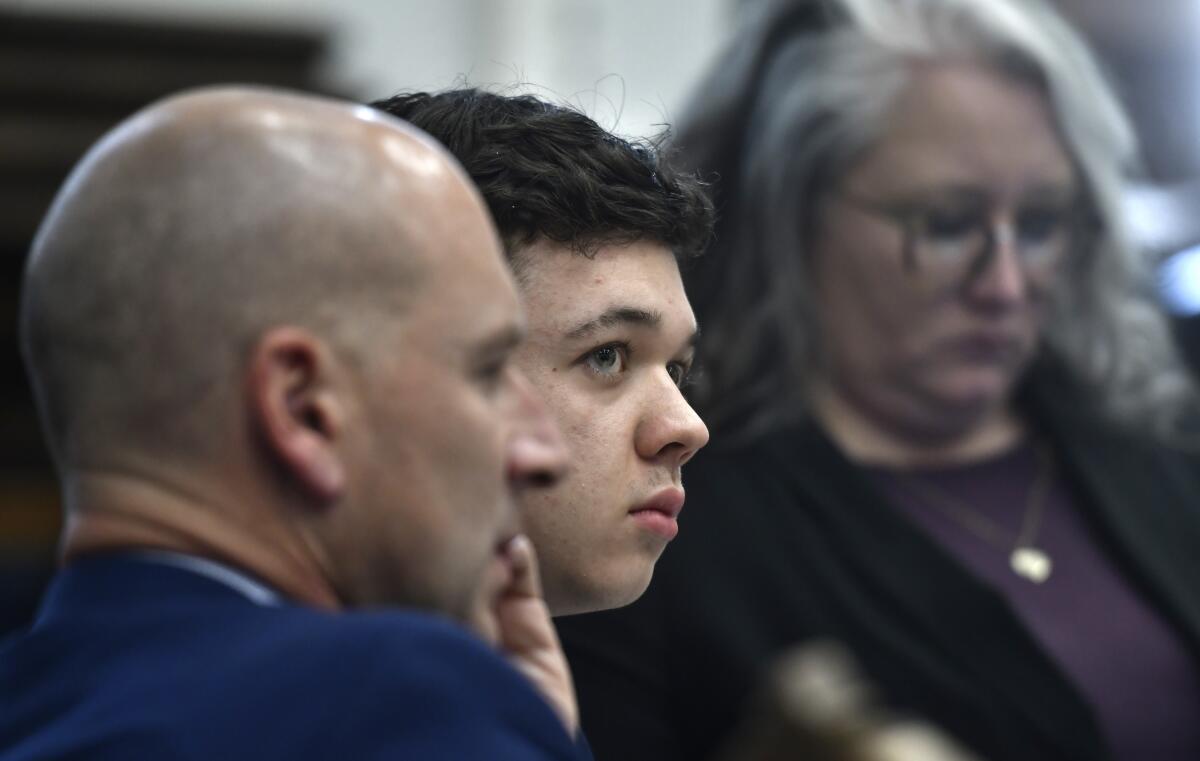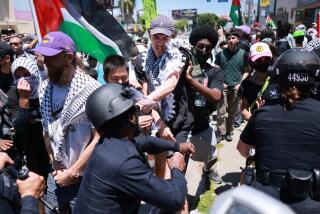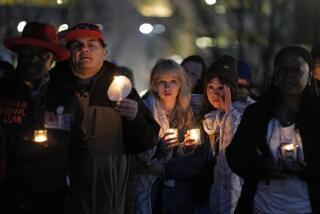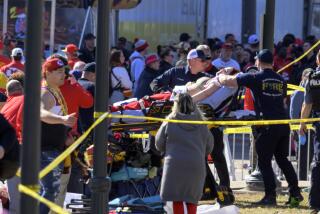Prosecutors show Rittenhouse trial jurors video of shootings

- Share via
KENOSHA, Wis. — The jury at Kyle Rittenhouse’s murder trial over three people he shot on the streets of Kenosha watched one of the central pieces of video evidence Wednesday — footage of a man chasing him and throwing a plastic bag at him just before Rittenhouse gunned the man down.
Someone is heard yelling, “F--- you!” followed by the sounds of the four shots Rittenhouse fired, killing Joseph Rosenbaum, though the shooting itself is not clearly seen on camera. Rosenbaum was the first of three men Rittenhouse shot that night, two of them fatally.
“Oh, he shot him! He shot him, man. He shot him. He shot him, man. He laid him out,” the person making the video can be heard saying.
Footage shown to the jury also depicted Rosenbaum lying on the ground as frantic bystanders surrounded him to help. He had a wound to his head, and a bystander placed a shirt on it to apply pressure.
The scenes were part of a wealth of video played in court that captured the chaos and the repeated sound of gunfire on the night Rittenhouse, then 17, fired an assault-style rifle during a tumultuous demonstration against police brutality in the summer of 2020.
In the courtroom, Rittenhouse — seated in the jurors’ line of sight — kept his eyes fixed on a desktop screen and showed no emotion as video depicted him walking down a street with his rifle and shooting at protesters, people scattering and screaming.
Many of the videos played in court were found by police on social media sites, where lots of footage was streamed live or promptly posted after the bloodshed, and many of the scenes were familiar to those following the case.
Rittenhouse, now 18, could get life in prison if convicted in the case that has stirred furious debate over self-defense, vigilantism, the right to bear arms and the racial unrest that erupted around the U.S. after the police killing of George Floyd in Minneapolis and other cases like it.
The young man traveled to Kenosha from his home in Illinois after violent protests broke out over the shooting of a Black man, Jacob Blake, by a white Kenosha police officer. Rittenhouse said he went there to protect property after two nights in which rioters set fires and ransacked businesses.
Prosecutors have portrayed him as the instigator of the bloodshed, while his lawyer argued that he acted in self-defense after Rosenbaum tried to grab his gun and others in the crowd kicked him in the face and hit him in the head with a skateboard.
A Kenosha detective who took the stand detailed injuries Rittenhouse suffered that night, all seemingly minor: a half-inch scratch above his eyebrow, a small cut inside his lower lip, a 2-inch scratch below his collarbone, a 2-inch scratch on his forearm, a scratch on his back and two bumps the size of pennies on his head.
Prosecutor Thomas Binger drove home the point that Rosenbaum was apparently unarmed, asking Kenosha Police Det. Martin Howard if any of the videos shown in court indicated Rosenbaum had a weapon of any kind. Howard replied no.
“No gun?” Binger asked.
“I can only see a plastic bag he’s carrying,” Howard said.
“So no gun? Binger asked.
“No,” replied Howard, who repeated the answer when Binger also asked him whether Rosenbaum carried a knife, bat or club.
But on cross-examination, Rittenhouse attorney Mark Richards asked Howard what can happen if a weapon is taken from someone.
“It can be used against them as a deadly and dangerous weapon, correct?” Richards asked.
“Correct,” Howard replied.
Richards also said that Rittenhouse shouted, “Friendly! Friendly! Friendly!” as he was being chased by Rosenbaum. Howard agreed, and said it looked as if Rosenbaum was gaining ground on Rittenhouse.
The defense attorney, describing how Rosenbaum came out from behind a car to meet Rittenhouse before the shooting, said to the detective: “Correct me if I’m wrong, but this looks like the classic ambush.”
After prosecutors objected, Richards said: “Mr. Rosenbaum is in hiding as my client arrives, correct?”
“It appears so, yes,” Howard answered.
Other video played for the jury showed Rittenhouse saying before the shootings that he was there to protect property and provide medical care to anyone who was hurt.
An interviewer mentioned nonlethal weapons and Rittenhouse responded: “We don’t have nonlethal.” The man filming the video then asked if Rittenhouse was “full-on” ready to defend the property and he replied, “Yes, we are.”
Yet another video captured the sound of a single gunshot, which authorities said was fired into the air by someone in the crowd other than Rittenhouse. The defense has said that that shot made Rittenhouse think he was under attack.
Jurors set their notepads aside and kept their eyes glued to the courtroom monitors as video showed people carrying one of the wounded as some screamed for medical help.
Earlier, jurors seemed to take extensive notes when testimony turned to the level of violence at the Kenosha protests, which included protesters throwing firebombs and rocks on the night of the shooting.
Moments after shooting the 36-year-old Rosenbaum, Rittenhouse shot and killed Anthony Huber, 26, a protester from Silver Lake, Wis., who was seen on bystander video hitting Rittenhouse with a skateboard.
Rittenhouse then shot and wounded Gaige Grosskreutz, 27, a protester from West Allis, Wis., who had a gun in his hand as he stepped toward Rittenhouse.
Tarm reported from Kenosha, Forliti from Minneapolis and Webber from Fenton, Mich. Associated Press writer Scott Bauer in Madison, Wis., contributed to this report.
More to Read
Sign up for Essential California
The most important California stories and recommendations in your inbox every morning.
You may occasionally receive promotional content from the Los Angeles Times.










